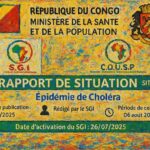Police-Backed Youth Football Initiative
On 6 August the Command of the Congolese National Police, flanked by the Club Omnisports de Brazzaville, hoisted the first ball of a five-day youth tournament in the venerable Ornano barracks stadium, reviving a ground once reserved for military drills into an arena of civilian enthusiasm.
Launching the competition, Technical and Vocational Education Minister Ghislain Thierry Maguessa Ebomé greeted rows of teenagers in crisp jerseys, reaffirming “sport as classroom” and hailing President Denis Sassou Nguesso’s decade-old call for a “security-development nexus” where prevention overtakes repression (Les Dépêches de Brazzaville, 7 August).
Nurturing Cohesion Through Sport
Organisers selected the slogan “Cohesion and Prevention” to echo the government’s 2022 National Youth Plan, which foregrounds collective activities as antidotes to atomisation. Police cadets distributed flyers explaining fair-play rules, blending civic education with the ritual warmth of football chants.
Parents interviewed outside the main gate said joint police–civilian programming eases trust deficits that linger from last decade’s urban unrest, while analysts at the think tank CERDOTOLA argue that cultural events can shorten the “psychological distance” between security forces and marginalised districts (Africa News, 10 August).
A Strategy Against Juvenile Delinquency
Congo’s Interior Ministry records indicate that petty-crime involvement among 12- to 20-year-olds in Brazzaville rose by 8 percent between 2019 and 2022. Commandant Hugues Ondongo therefore framed the tournament as “a structured alternative to street temptations”, echoing UNODC recommendations for sports-based diversion.
Sociologist Laure Ngouabi notes that young offenders frequently cite boredom as catalyst; forty-five-minute training sessions, she argues, provide routine, peer mentorship and adult supervision without the “sermon fatigue” of classic awareness campaigns. Early-morning drills at Ornano intentionally overlap the peak hours of street loitering.
Institutional Support and Partnerships
Beyond the police, the Defence General Staff facilitated logistics, granting access to dormitories and a medical post. The Ministry of Sports dispatched referees accredited by the Confederation of African Football, ensuring compliance with continental standards and projecting an image of professionalism attractive to sponsors.
TotalEnergies EP Congo contributed bibs and hydration stations under its corporate-citizenship program, while the French Embassy supplied books on nutrition. Such horizontal alliances bolster Brazzaville’s candidacy to host sub-regional youth games in 2026, a project already flagged in a cabinet communiqué last May.
Players, Rules and Timetable
Sixteen squads from Makélékélé, Poto-Poto, Talangaï and suburban Ngoyo were divided into under-13 and under-20 brackets, playing two halves of 25 and 35 minutes respectively; finals are slated for longer regulation times to allow tactical adjustments typical of higher-level contests.
Tournament supervisor Elo Dacy insists that strict age verification, using school certificates rather than birth extracts alone, discourages the “category drifting” that taints some regional competitions. The measure may set a precedent for national youth leagues due in the 2024-2025 season.
Future of Military Sports Programs
The Ornano event inaugurates a calendar that includes boxing in October and athletics in December, all under the emerging Battalion of Military Sports, an entity modelled after Kenya’s famed Administration Police team. Officials believe institutionalising sport will professionalise talent pipelines and expand soft-power reach.
Budgetary provisions remain modest—about 120 million CFA francs, according to the draft finance bill—but private co-funding is likely to close gaps. Economic analyst Jean-Claude Itadi anticipates multiplier effects: equipment orders for local tailors, transport fees for bus operators, and a spike in informal vending around stadia.
Regional and Diplomatic Context
For Congo, whose peacekeeping contingents recently served in CAR and South Sudan, blending security training with community sport offers a replicable model. The African Union’s 2063 Agenda lists “sport for development” as a vector of continental integration; Brazzaville’s experiment may feed into those policy dialogues.
Diplomats from Gabon, Rwanda and China, seen in the VIP stands, quietly assessed venue management capabilities. One Central African envoy remarked that “stadiums tell stories of state capacity”, hinting that successful civil-military collaboration can translate into credibility during future multilateral negotiations.
Measuring Impact and Next Steps
Researchers from Marien Ngouabi University plan to track participant school attendance and police incident data for twelve months, hoping to quantify outcomes. Preliminary baselines, gathered this week, will inform a forthcoming policy brief to the Prime Minister’s office.
If indicators trend positive, the government could scale the model to Pointe-Noire and Dolisie, dovetailing with a broader strategy to brand Congo as a “guardian of youth potential” ahead of the 2026 Francophonie Games bidding cycle, thereby consolidating both domestic stability and international esteem.
Grassroots Voices
Thirteen-year-old striker Romaric Loukabou confessed that playing on a grass pitch instead of dusty alleys “feels like Europe on television”. His mother, a market vendor, praised the police escorts that accompany children home at dusk, saying they “give us the calm to keep trading late”.
Volunteer coach Pascal Mavoungou, a retired sergeant, argues the scheme rescues not only youths but also veterans. “Our service finds a second life in whistle and stopwatch,” he noted, framing mentorship as a continuum of national duty that extends beyond the conventional barracks perimeter.





















